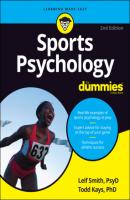Sports Psychology For Dummies. Leif H. Smith
Чтение книги онлайн.

Читать онлайн книгу Sports Psychology For Dummies - Leif H. Smith страница 21
Название: Sports Psychology For Dummies
Автор: Leif H. Smith
Издательство: John Wiley & Sons Limited
Жанр: Спорт, фитнес
isbn: 9781119856016
isbn:
If you play because you love the sport, at what level is your “love”? (1-10, with 1 being low and 10 being high.)
If you are playing because of something other than love of the game, is this a reason that will continue in the coming years?
What are some internal things you can do or think about to motivate yourself and move your love of the game and motivation levels higher on your 1-10 scale?
Maximizing Your Motivation: How Small Sparks Can Become Bonfires
Motivation is a complex mix of multiple issues, so you’ll be addressing and adjusting it throughout your career. In this section, we give you some strategies for improving your motivation — you can pick and choose different strategies at different times, and see what works best for you.
Being completely honest with yourself
One of the most frightening but motivating tasks you can undertake is to be honest with yourself about your current level of motivation, why you are playing sports, what your goals are for your sport, how good you actually are, what skills need improvement, your mental toughness, areas in which you simply are not that good, and so on. Being completely honest may be painful, but motivation always increases when you clear away the excuses.
Thinking about why you play the game
Throughout the season, revisit your reasons for participating in your sport. The season can be long, and it’s natural to wonder why you’re putting yourself through the physical and mental challenges. Many sports these days are year-round, making it even more important to assess your motivation levels.
Being curious and non-judgmental
Curiosity is a wonderful mindset that can help you maintain your motivation levels in sports. Being curious means looking at your sport participation like a child would — asking questions (How can this help me? How can I get better today? What can I do to help my team this week?) and looking for powerful answers. Sports these days tend to be major commitments and they seldom have off-seasons. This means it is very important to avoid overtraining, overthinking, overanalyzing, and burning yourself out motivation-wise. Being curious helps you keep the right mindset. When you ask yourself powerful, motivating questions, you’ll get powerful, motivating answers!
Another mindset to cultivate is that of being non-judgmental. This means not being so hard on yourself for your mistakes and failures. (We cover this more extensively in Chapter 12, where we discuss the tool of mindfulness!) It also means trying to avoid the trap of comparing yourself to others and always looking for negatives in your game. Try to keep a non-judgmental mindset, and you’ll be happier and more motivated in the long run.
Focusing on tasks, not ego
Sports psychologists like to talk about task orientation and ego orientation. If you’re focused on the tasks of getting better — on those things over which you have control — your motivation will grow. Task orientation is common among people who have high internal motivation. Ego orientation, on the other hand, is more focused on the external rewards of competing, such as winning, money, success, fame, and media exposure. Most professional athletes have a combination of both ego and task orientation, with a greater emphasis on task orientation.
As an athlete, you’ll feel more motivated when you’re confident in your skill set and believe in your ability to continue to improve. And you’ll feel more motivated to practice and compete when you’re performing well or when you feel confident in your athletic skills and potential. This confidence occurs regardless of whether you receive any external rewards, such as praise from your coaches or parents.
Remember also that accomplishing small tasks — which we discuss in Chapter 3 — can be very motivating. At times, training for 3-6 months can feel like a long time and your motivation may wax and wane. However, if you focus on accomplishing tiny, “baby” steps today, your motivation and confidence grow. Go inch-by-inch and eventually you will go a mile.
Finding ways to experience success
When you’re successful, your motivation will typically go up. So, make sure to put yourself in situations where you can be successful. For example, if you’re in a slump, work with your coach and break down complex skills into simple tasks. You can achieve success with these simple tasks, which will motivate you to get better. Focus on tiny process goals that you can accomplish right now, even in the next few minutes. For example, you may run a mile, spend 15 minutes on visualization, or spend 5 minutes studying the playbook.
Mixing up your training
Variety adds spice and energy to your training. Change your workouts and practice routines from time to time to keep your motivation up. Every sport involves some repetition, but you don’t have to practice in the same way, or at the same pace and time every day. Working on a variety of practice drills can shake things up and keep you from getting bored and losing motivation.
Think about mind-skill training as well. Many times athletes focus solely on physical training skills. As an example, we frequently discuss with golfers the best way to train. They never hit 20 balls in a row, consecutively, during a game. Golfers do this on the range all of the time, however. Instead, we encourage our golfers to hit one ball, going through their pre-shot routine and assessing the shot from a skill and mental standpoint. We would rather a golfer hit 20 balls in 45 minutes and do so as they СКАЧАТЬ